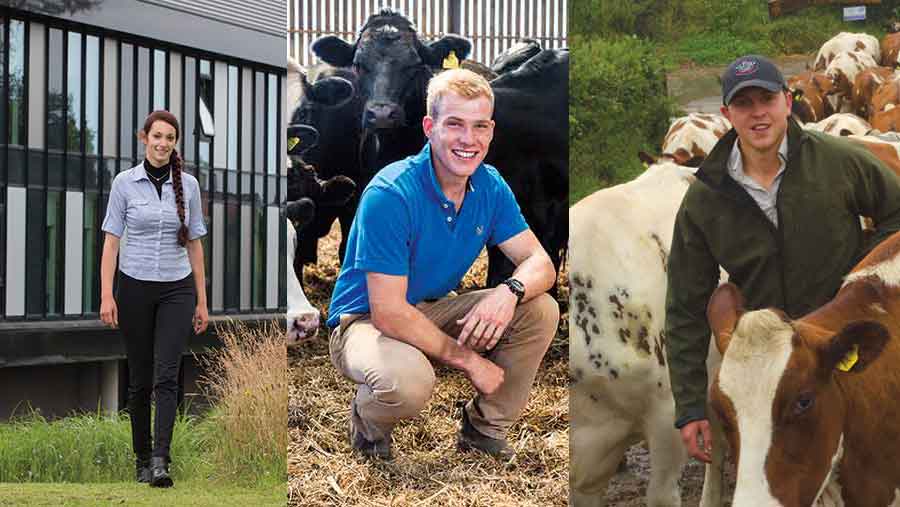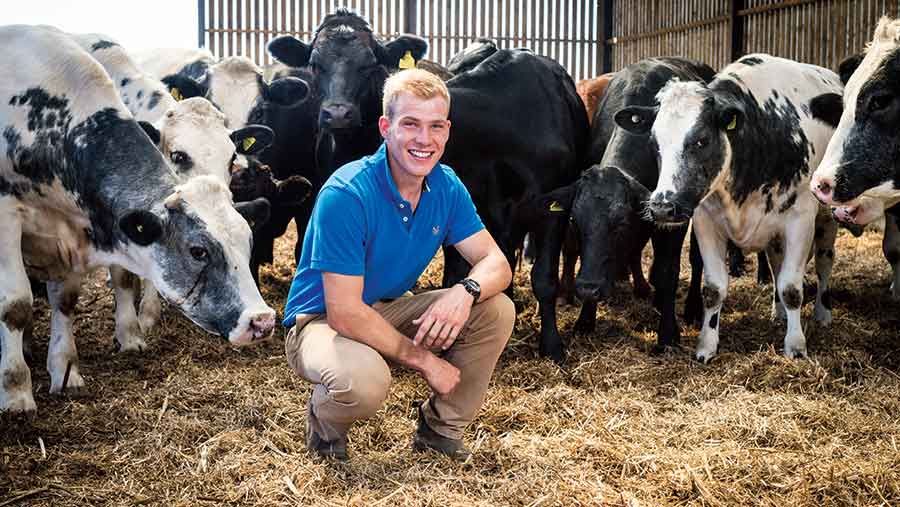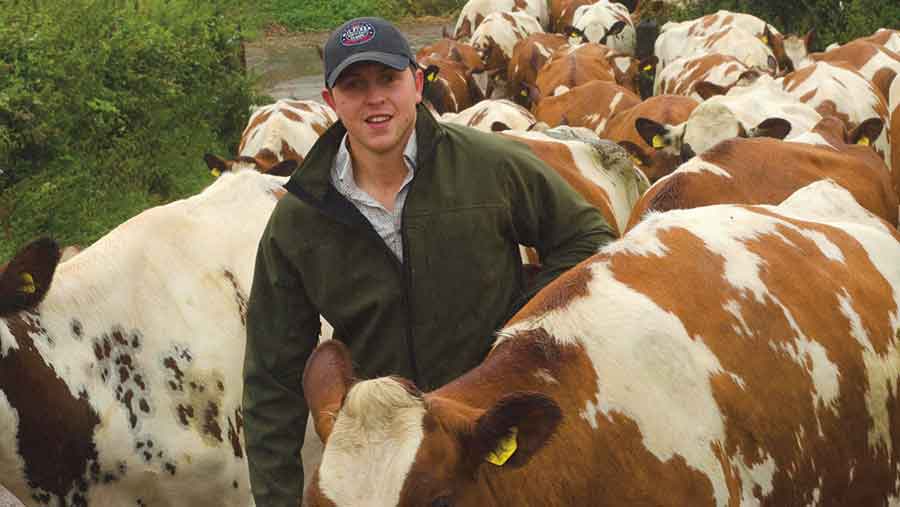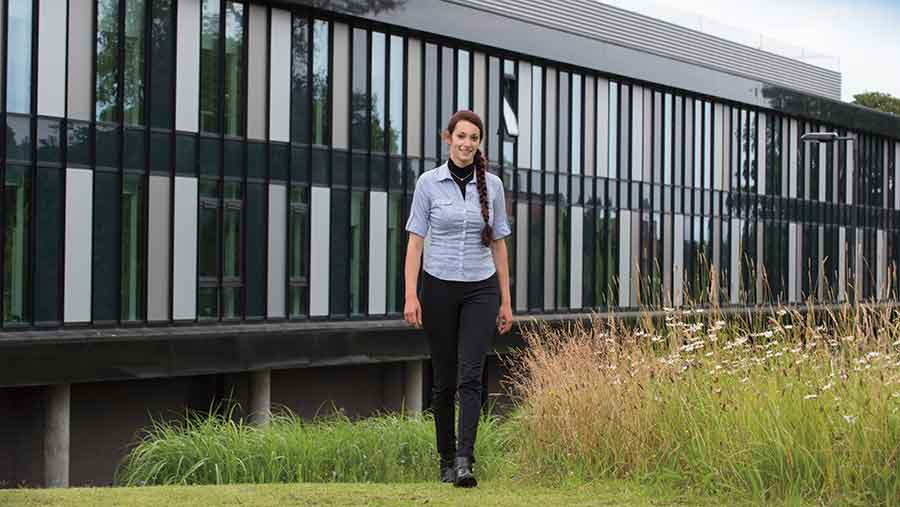2016 Farmers Weekly Awards: Ag Student finalists revealed

From left: Claire Simonetta, Oliver Inman and Oliver Lee
The Farmers Weekly Awards celebrate the very best of British farming by recognising and rewarding innovation, hard work and passion for agriculture.
Coming from non-farming backgrounds, all three of our finalists exhibit a burning passion for livestock farming and each has already built up an impressive track record. Expect to hear more of these talented young people.
See also: Keep up to date with all the latest Farmers Weekly Awards news
Oliver Inman
Askham Bryan College
Although there is no farming in his family background, Oliver Inman got the agriculture bug at an early age.
Starting with cultivating vegetables in his back garden as a boy, Ollie progressed to keeping 15 hens, selling the eggs to friends, family and anyone else who would buy them.

© Jim Varney
The 20-year-old has just completed his Level 3 Advanced Apprenticeship in Livestock Production at Askham Bryan College in York. He has become a valued and trusted right-hand man on the beef farm where he works as part of his apprenticeship, runs his own small pedigree sheep business and regularly takes up work experience opportunities on other farms.
Aged 14, Ollie started working in a local farm shop, initially for no pay but just to gain experience, working alongside seasonal employees from Bulgaria.
“The farm produced a huge range of things, from pigs to asparagus, so it was a great experience,” he recalls.
Student Notes
- Age: 20
- College: Askham Bryan, York
- Course: Advanced Apprenticeship in Livestock Production, 3rd year
- Ambition: Become a farm manager on an estate, build up his own sheep enterprise, start a calf rearing business
At 16, Ollie started studying full-time at Askham Bryan, but after a year decided to change tack and go for the work-based apprenticeship route. “I did it purely to increase my time spent farming and learning on the job,” he explains. “It’s also given me the chance to build a reputation and grow a network.”
He currently works on an intensive, all-year-housed beef farm, finishing mainly Angus cattle. On the farm he is totally responsible for feed mixing, building a reputation for accuracy, with an average error of less than 1%.
But he has also found time to develop his own sheep enterprise. His first set of home-bred Texel-cross lambs achieved the top price at Thirsk market. “The price was achieved with minimal input as the lambs were finished on grass,” he adds. “I think that’s important for the industry at the moment, with rising costs and shrinking returns.”
Ollie sold his Texels to buy pedigree Suffolks. “I was never going to make much money selling a few commercial sheep,” he explains. “If I can sell a pedigree tup for £400-£500 I can make much more.”
Ollie has just finished his Level 3 diploma and plans to follow up with the Level 4 Higher Apprenticeship. “I hope to increase my understanding of farm management,” he says. “That’s important, as in the near future I will be running my own business.”
The Judges Liked
- Determination to gain knowledge and experience wherever he can find it
- Self-belief and commitment – making his way despite no family background in farming
- Entrepreneurial drive from an early age
- Maturity beyond his years
Last year Ollie won one of four places on The Cattleman’s Academy, a programme run by Asda and processor ABP, which gives students the opportunity to experience the whole beef supply chain, from farm to fork. He spent a week each working with two top beef producers – Adrian Ivory in Scotland, a former Farmers Weekly Farmer of the Year, and Brian Wilson in Stafford.
“We found Ollie to be an exceptional worker,” Adrian said. “We were extremely impressed with his dedication and willingness to learn and think he will go far in the industry. I would happily employ Ollie tomorrow.”
Ollie’s course manager, Linda Lloyd, is equally glowing in her praise. “He’s an ambitious young man and shows all the academic, personal and vocational skills to make a difference in the agriculture industry”, she says.
Ollie is always looking for opportunities to extend his knowledge and expertise. “I like to gain work experience wherever I can and I’m willing to work for nothing if I feel I can gain valuable knowledge,” he says. He also attends talks by local vets, to learn from both the vets and the local farmers, and has been to “Live to Dead” days at a local meat processor.
In November he aims to head off to New Zealand to widen his experience further, paying his way by working as a contract shearer.
He is also keen to contribute to his local community. Last Christmas he gave up his spare time to drive a tractor at the farm where he had his first job in the farm shop, pulling a sleigh full of passengers to visit “Santa’s Woodland Village”.
On Boxing Day last year, at a time of serious flooding, Ollie spent most of the day bucketing water off the driveway of an elderly couple, managing to keep the water out of their home.
In five years, Ollie hopes to be a stockman or possibly a farm manager on an estate. “But I would always like to manage my own sheep enterprise alongside,” he says. He aims to expand his pedigree Suffolk flock on to rented grassland.
“I’d like to branch out into different areas of sheep husbandry, including scanning,” he adds.
Once he has established a successful sheep business, Ollie has ambitions to rent or buy a shed in which he can rear calves.
And he hopes to repay some of the support that he has received over the years by helping others like him to get their start in farming.
“Without the enthusiasm and support that I have been offered by the local farming community I would not have been able to get such a solid start to my career,” he says. “I hope that one day I too can inspire someone from a non-farming background and show them that it’s possible to be successful in agriculture.”
Oliver Lee
Duchy College
If circumstances had played out slightly differently, Oliver Lee could be in Rio right now preparing to compete in the 2016 Olympic Games.
The 23-year-old second-year agriculture student at Duchy College in Cornwall was a promising swimmer in his teens – at 18 he was ranked third in the country for his age in the 50m butterfly.

© Josh Iskander
A worsening allergy to chlorine put paid to his ambitions in the water. But swimming’s loss looks to be farming’s gain.
The talented youngster has pursued his studies and business ambitions with the same dedication and attention to detail that he applied to his swimming. The results are reflected not only in Oli’s academic performance, but also in the wider impact he has had at the college, and in his progress in pursuing his dream of running his own business on land once farmed by his grandfather.
Although he didn’t grow up on a farm, Oli feels farming has always been in his blood. His grandfather ran a small dairy herd and he has fond memories of visiting the farm as a child and helping with the milking.
Student Notes
- Age: 23
- College: Duchy College, Cornwall
- Course: Foundation Degree in Agriculture, 2nd year
- Ambition: Run his own direct-to-consumer dairy business
But his grandfather struggled to make a living and most of the farm was sold 14 years ago. Deterred by this, Oli’s family discouraged him from thinking about farming as a career.
So he focused on his academic studies, gaining AAB in his A-levels, and started a chemistry degree at Manchester University. He got excellent grades at the end of his first year, but he soon decided that he couldn’t fight the pull of farming.
“My heart is set on becoming a farmer,” he insists. “That’s my overriding passion.”
So at the end of 2012, Oli took the radical decision to quit university and start working as a farmhand on a neighbour’s farm. His experience there, followed by six months working on an experimental fish farm in Canada, convinced him to study agriculture at university.
The Judges Liked
- Hunger for knowledge and willingness to seek it out wherever he can
- Focus and attention to detail in everything he takes on
- Impressive business plan for setting up his dairy business
Oli chose the foundation degree at Duchy College because it gave him the opportunity to learn at the same time as working part-time; Oli works two days a week on a local dairy and sheep farm.
Oli quickly impressed his course manager, Sam Walker. “Oliver is one of the best all-round students I have ever come across,” he says.
At the end of his first year Oli won the “Top Student” award for his course, and has since become the first student from the college to be accepted straight on to the final year of a BSc in Agriculture at Nottingham University.
From the start, Oli has played a leading role in the college. In his first year he set up the Duchy Society, to build stronger links with Plymouth University, which partners with Duchy College to deliver degree-level land-based courses.
Oli has also organised trips to visit local farms and businesses and is in the process of organising a study tour around the UK, visiting progressive and exciting farms and farmers.
Oli’s dream is to run a successful farm business on the 40 acres of his grandfather’s old farm still owned by his grandmother. He already runs a flock of 30 Whiteface Dartmoor sheep on 15 acres of the land. He gets a local butcher to slaughter the lambs which he then sells directly to local people.
But he has more ambitious plans for the land.
He has put hundreds of hours into developing a detailed business plan for Moor’ish Milk – a direct-to-consumer milk business.
The idea is to set up a micro-dairy – producing, pasteurising and bagging milk on-site and then delivering it to customers in the local area.
Oli has conducted market research, arranged access to finance through grants and the Enterprise Finance Guarantee scheme, planned and costed the initial investment in equipment and arranged to rent 20 cows from the farm where he works as a herdsman.
He feels strongly that farmers need to work much harder to connect with consumers and build their own brands, rather than being dependent on supermarkets, if they want to build a sustainable, profitable future. “You have to get your head out of the milking parlour and go out and talk to consumers,” he says. “That is at the heart of my business – connecting with the consumer.”
Following a serious health scare earlier this year, Oli has decided not to take up the place at Nottingham University but rather focus all his efforts on setting up Moor’ish Milk, planning to launch the business next March.
Oli has demonstrated a real hunger for information and advice, reaching out to local farmers and businesses to help develop his knowledge in areas such as marketing and business planning.
He is also involved in a benchmarking group, involving 23 dairy farmers in Devon and Cornwall, including Farmers Weekly’s 2015 Farmer of the Year, Pete Wastenage.
His interest in science has not waned, and as part of a college project Oli has developed a prototype milk sterilizer that uses ultraviolet light rather than pasteurisation to kill bacteria.
Oli is active in his Young Farmers Club, cycling from Holland to Switzerland to raise money for the Devon YFC Travel Scholarship and representing Devon in last month’s national debating finals. Last year he was given his Club Leaders award by Totnes Young Farmers.
He also enjoys showing schoolchildren around the farm where he works and hopes in future to be a voice for farming.
“In the longer term I want to help other people like myself to enter agriculture,” he says.
Claire Simonetta
SRUC
Five years ago Swiss-born Claire Simonetta was working as a paralegal for the Swiss equivalent of Companies House in Zurich, saving up to embark on a degree in astrophysics.
Today, the 25-year-old is preparing to start her fourth and final year of a BSc honours degree in Agriculture at the Ayr campus of SRUC in Scotland, while helping to run a beef and sheep hill farm on the Isle of Mull with her partner.

© Angus Findlay
She came top of her year in her third year exams, has won awards for her business and farming acumen, and, despite English not being her first language, is in demand both locally and nationally as an adviser on topics ranging from dog attacks on sheep to Scottish land reform and the challenges facing women in agriculture.
Student Notes
- Age: 25
- College: SRUC, Ayr, Scotland
- Course: BSc honours degree in Agriculture, 3rd year
- Ambition: Work as an agricultural consultant, build a high-welfare sheep & beef business and help to shape the future of Scottish agriculture
The change in direction that brought Claire to Scotland was as sudden as it was dramatic. Her mother had taken on a part-time job as a secretary for the Swiss Highland Cattle Society and was helping to organise a visit to a meeting of the Highland Cattle Society in Scotland. Claire tagged along and was instantly hooked.
“I didn’t understand a word – Scottish was just like Chinese to me,” she recalls. “But everything was so great – the landscape, the people, the culture. I realised that that’s what I really could imagine doing for the rest of my life”.
So she quit her job, arranged some temporary work with the Forestry Commission in Scotland, working with beef cattle on a grazing and conservation project, and headed for the airport.
For the next 18 months she systematically worked her way through a series of temporary placements on farms across Scotland and North Wales.
“I wanted to gain as much, different experience as possible,” she explains. “It was extremely valuable. I learned so much and it really helped prepare me for my studies. And it convinced me this is what I really wanted to do”.
The Judges Liked
- Powerful combination of academic excellence and practical skills
- Articulate and knowledgeable about the key issues facing Scottish agriculture
- Passionate about farming and committed to making a difference
It was during this voyage of discovery that she decided to apply to study agriculture at SRUC.
It was also how she met her partner, a tenant hill farmer on Mull.
Claire is now a vital part of the operation, taking full responsibility for the record-keeping and accountancy side of the business. She is currently working on expansion plans, including the future acquisition of land to take wintering and grazing stock as well as store animals for fattening prior to slaughter.
Last year Claire won the prestigious AgriScot Business Skills Award, held each year at Scotland’s second biggest agricultural event. The award, and the £1,000 prize, is given to the young person judged to have the best business skills and greatest awareness of current agribusiness issues.
Sandy Ramsay, head of SAC Consulting, who has chaired the judging panel for several years, described Claire as “one of the most worthy winners of this award”.
One of the other judges, former NFU Scotland President John Kinnaird, was so impressed with Claire’s answers to questions on tenancy issues that he asked her to join a group looking at how the Land Reform Act in Scotland can be made to deliver a sustainable future for those who work in the rural community.
She has also been asked to join a study group organised by the James Hutton Institute to look at the role and status of women in agriculture.
Claire is respected by her fellow students, who elected her as their representative on the Student Liaison Committee.
“Students respect her because she knows what she is talking about,” says Dr Jan Connell, Programme Leader for Agriculture at SRUC. “She helps to raise the level of other students in the class.”
Claire is also very active in her local farming community on Mull. She has contributed to the Mull community Facebook page, alerting people to the dangers of allowing dogs off the lead near sheep, and has been consulted by local farmers on how to deal with sheep worrying. She has also created a Facebook page as a resource specifically for the Mull farming community.
Earlier this year Claire wrote a proposal to create a supply co-operative for the Isle of Mull. It ended up winning first prize in the Next Generation competition organised by the Scottish Agricultural Organisation Society.
Claire believes that technology can play an important part in improving farm performance, and has been trialling the use of hand-held stock recorders, not typically used on hill farms. She wrote a technical note on the subject which has since been taken up and used by the company supplying the technology and SRUC.
After graduating Claire wants to work as an agricultural consultant with an organisation such as SAC Consulting, while continuing to work part-time on the farm on Mull. And she has ambitions to take up a Nuffield farming scholarship, focusing on the relationship between subsidy systems and farm efficiency in countries around the world and developing proposals on how Scotland could better target farming grants.
She also wants to play a wider role in helping to shape the future of Scottish agriculture, including finding ways to help talented young people get into the business.
“At university you meet so many young, talented, enthusiastic people, some of whom just won’t have a chance to get into farming, and that’s a real shame.”
The three finalists represent the very best of the new generation of smart, motivated young people taking their first steps in farming. Their passion, determination and sheer talent bodes well for the future of the industry.”
Richard Newell
Head of agriculture
![]()
